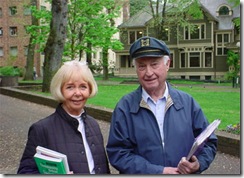 For the most part, our own education wasn’t on our minds as we raised our families and toiled away at our jobs. Most of our structured learning was completed in the classroom many years earlier, with the possibility of a little on-the-job training scattered in during our adult years.
For the most part, our own education wasn’t on our minds as we raised our families and toiled away at our jobs. Most of our structured learning was completed in the classroom many years earlier, with the possibility of a little on-the-job training scattered in during our adult years.
When we hear the term “lifelong learning” we may think of those with Ph.D.s or the very few who had the time to engage in classes on topics that were of interest to them. We chalked it up to the pursuits of those with time and money.
So what has changed?
According to AARP, 90 percent of boomers surveyed said they wanted to actively seek out learning opportunities to keep current, grow personally and enjoy the pleasure of mastering something new.
Research also continues to highlight the importance of lifelong learning as a prescription for a longer, healthier life—keeping our brains strong and flexible, our minds open to new things and our lives enriched and filled with new relationships.
Now that we are older, learning is no longer confined to classrooms, tests and term papers. We are free to construct any number of learning opportunities. In the new lingo, they are called “enriched environments.”
Participating in lectures, seminars and discussion groups exposes our brain to new concepts and information. Learning a foreign language or new instrument also exercises our brain. Traveling is another way to combine social interaction and learning.
Libraries, community colleges and community television (like TOTV) offer local learning opportunities.
If you’re Internet savvy, the Massachusetts Institute of Technology offers nearly 2,000 academic courses complete with syllabuses, assignments, video lectures and exams—all for free. You can visit the MIT OpenCourseWare project at http://ocw.mit.edu/index.htm.
Cornell’s Adult University CyberTower study rooms are interesting mini courses. Each “room” includes video-streamed lectures on a selected topic and links to websites selected by the faculty. Within CyberTower Classic, you’ll find a video library of more than 100 interviews, lectures and commentaries by the university’s faculty.
For instance, listen in on “Autism” by Temple Grandin or “Where Did Rhythm-and-Blues Come From?” by Steven F. Pond.
You can access CyberTower Classic at http://sandstone5. cit.cornell.edu/Requester/r.
Eighty-three-year-old Tom, a retired pharmacist, wants to “fill in the gaps” of his science education with liberal arts studies like history, politics and how things work. Nancy wants to “learn on a scholarly level without the stress of tests and papers.” Dick would like to “create some structure” in his retirement and “fill a void” in his life experiences.
All three are current students at Osher Lifelong Learning Institute at Cal State Channel Islands.
Some of the courses at OLLI combine classroom time with road trips to gain a hands-on learning experience.
Courses at OLLI are diverse and unique—not your typical college curriculum. The upcoming semester includes titles such as “Hidden emotions: Examples from pop songs,” “The late 20th century American presidency,” “Slapstick, stand-up and sitcom” and “Immigration and ethnic identity.”
There are more than 117 lifelong learning institutes throughout the U.S. To take advantage of classes, mature learners (that’s us) must be over the age of 50 and be interested in self-directed growth and challenge.
Most OLLI students work part time or are retired, as many of the courses are offered during the day. Learners can sign up for a course or for a yearlong membership allowing them virtually unlimited courses in the fall, winter and spring sessions.
Keeping your mind energized and actively engaged is an important part of healthy aging and offers a powerful tool for personal enrichment.
To view upcoming course choices for spring 2011, log on to www.csuci.edu/exed/ Spring_ 2011_ Registration_ Form. pdf or call (805) 437-2748.
More ...
Tags: lifelong learning,enriched environments,online courses